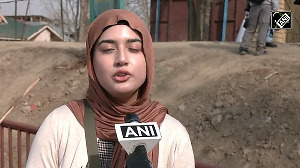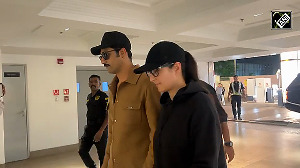The Indian Space Research Organisation (ISRO) is all set to go ahead with its ambitious unmanned moon mission and plans to seek a green signal from the Union government in the next 8-10 months.
A galaxy of 60 top scientists and technologists held a marathon meeting in Bangalore on Friday to discuss the lunar mission plan.
A peer review meeting of the lunar mission study task force has decided to submit a detailed report to the Centre for approval.
"Based on the discussions, a project report will be sent to the prime minister, who also heads the Department of Space.
We will also incorporate the suggestions and recommendations of the scientific community, which was represented by the heads of various government and private organisations," an ISRO official told rediff.com
Among those who participated in the meeting were ISRO chairman K Kasturirangan, former scientific advisor to the prime minister M G K Menon, former UGC chairman Yashpal, National Institute of Advanced Studies director Roddam Narasimha, and astro-physicist Jayant Narlikar.
"In spite of divergent views aired in public on the viability of the project, we are on course to launch the mission," sources added.
ISRO proposes to send a vehicle to orbit the moon by 2005 at an estimated cost of $120million to conduct experiments that will unravel the mysteries of the satellite.
"By embarking on the lunar mission, we want to demonstrate that India can also undertake complex projects involving cutting-edge space technologies," Kasturirangan had stated at the 90th Indian Science Congress held in Bangalore recently.
A Bangalore-based scientist, who worked on India's missile program earlier, however, decried the project saying it would not lead to any tangible benefit to the country's 1-billion population.
While the US remains ahead of other countries in the sphere of lunar missions, including manned ones, Russia (the erstwhile Soviet Union) and Japan later joined the bandwagon by launching unmanned missions of their own.
Incidentally, China is planning a manned mission in the next two years to explore the secrets of the heavenly body.






 © 2025
© 2025